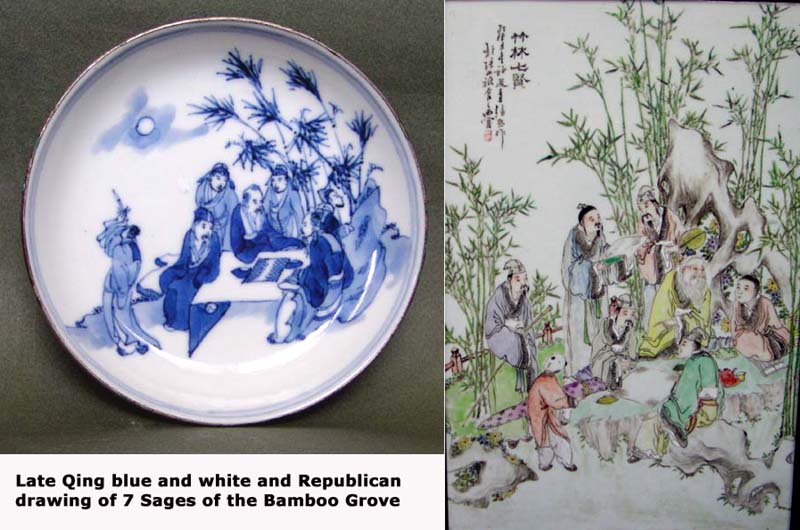
7 Sages of Bamboo Grove
During the late wei period, there was a gathering of 7 men at the bamboo groove. They were called Zhu Lin Qi Xian (竹林七贤) ie Seven Virtuous Men (sages) of the Bamboo Grove. They were famous for their unrestrained behaviours which was strange by traditional and social conventions.
They engaged in drinking, making music, composing poetry, and talking about metaphysical philosophies in the Bamboo Grove. Their intention was to escape being drawn into the complicated politics of the period. The gathering lasted from about 248-254 A.D. The seven men are: (extracted from www.chinaHistoryForum. To read details, please click)
(1) 阮籍 Ruan Ji (AD
210-263) hailed from Chen Liu (陈留) in He Nan (河南).
His father Ruan Yü (阮瑀) was one of the Seven
Scholars of the Jian An reign (建安七子),
i.e., the last emperor of the Eastern Han dynasty. Sima Zhao (司马昭)
had wanted to propose a marriage between their families, but Ruan Ji managed to
stay drunk for 60 days, denying Sima Zhao the opportunity to bring up the
subject. Nonetheless, he found himself compelled to serve the Sima clan several
times, including composing the "petition" for elevating Sima Zhao to
be the Duke of Jin. For those reasons, the Sima clan tolerated his wild
behaviours.
(2) 嵇康 Ji Kang (AD 223-262). A native of Qiao
Guo (谯国) in An Hui (安徽).
His family was related by marriage to ruling Cao clan of the Wei (魏)
Dynasty. He wrote an article to severe ties with another member, Shan Tao, when
the latter accepted official appointment from the Sima regime. Ji Kang was later
charged with sedition and executed. Most famous for being unable to pass on his
music composition, Guang Ling Shan 《广陵散》.
(3) 山涛 Shan Tao from He Nei (河内),
the oldest of the group who had established his own fame prior to the forming of
the group. Despite his being close to Ji Kang and Ruan Ji, his real nature
differed, he even nominated Ji Kang for officialdom, leading to their ties
severed. Nevertheless, he was known for being thrifty. 20 years after Ji Kang's
death, Shan Tao nominated Ji Kang's son, Ji Shao (嵇绍)
to an official post as a means of livelihood, out of memory of his friendship to
Ji Kang. It was said that he was meticulous about interacting with power
factions, and had foresight with which he used to keep himself safe from
becoming a casualty of power struggles.
(4) 刘伶 Liu Ling of Pei country (沛国)
in An Hui was a former official at the end of the Wei dynasty. Most notorious
for his love of drink ("天生刘伶,以酒为名,一饮一斛,五斗解酲").
He was said to travel with a spade, and gave instructions to be buried wherever
he happen to fall dead. His Ode to Wine 《酒德颂》 reflected
the sentiments of many scholars feeling the lack of orthodox legitimacy of the
prevailing regime, coupled by the corrupt nature of the Imperial Court, using
their drunkenness as an outlet of their emotions.
(5) 阮咸 Ruan Xian, nephew to Ruan Ji. Also
another notorious drink lover who oft drank straight from the jar rather than
drinking cups. Even drank with herd of swine once and make music at the same
time. He had an affair with a maid of his aunt, and even went after the maid
when the aunt was returning home. His setting up a family with the maid was
smack against the customs and conventions.
(6) 向秀 Xiang Xiu of He Nan (河南).
Compelled to accept official appointment after the death of Ji Kang. He was
remembered for making extensive commentary on Zhuang Zi's works.
(7) 王戎 Wang Rong of Lang Ya (琅邪)
in Shan Dong (山东) was a child prodigy and later,
a major official in the Jin dynasty. He was the most worldly of the Seven.
He and his wife could spend the entire night counting their coins using
toothpicks as tokens. He dug the seeds out of the pears of his gardens before
they were sold in the market, fearing others would plant those seeds.
The painting showing the 7 sages at bamboo grove was very popular and could be found in Ming/Qing porcelain.
